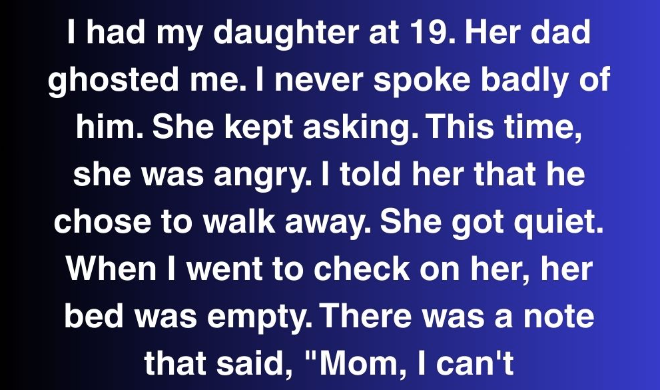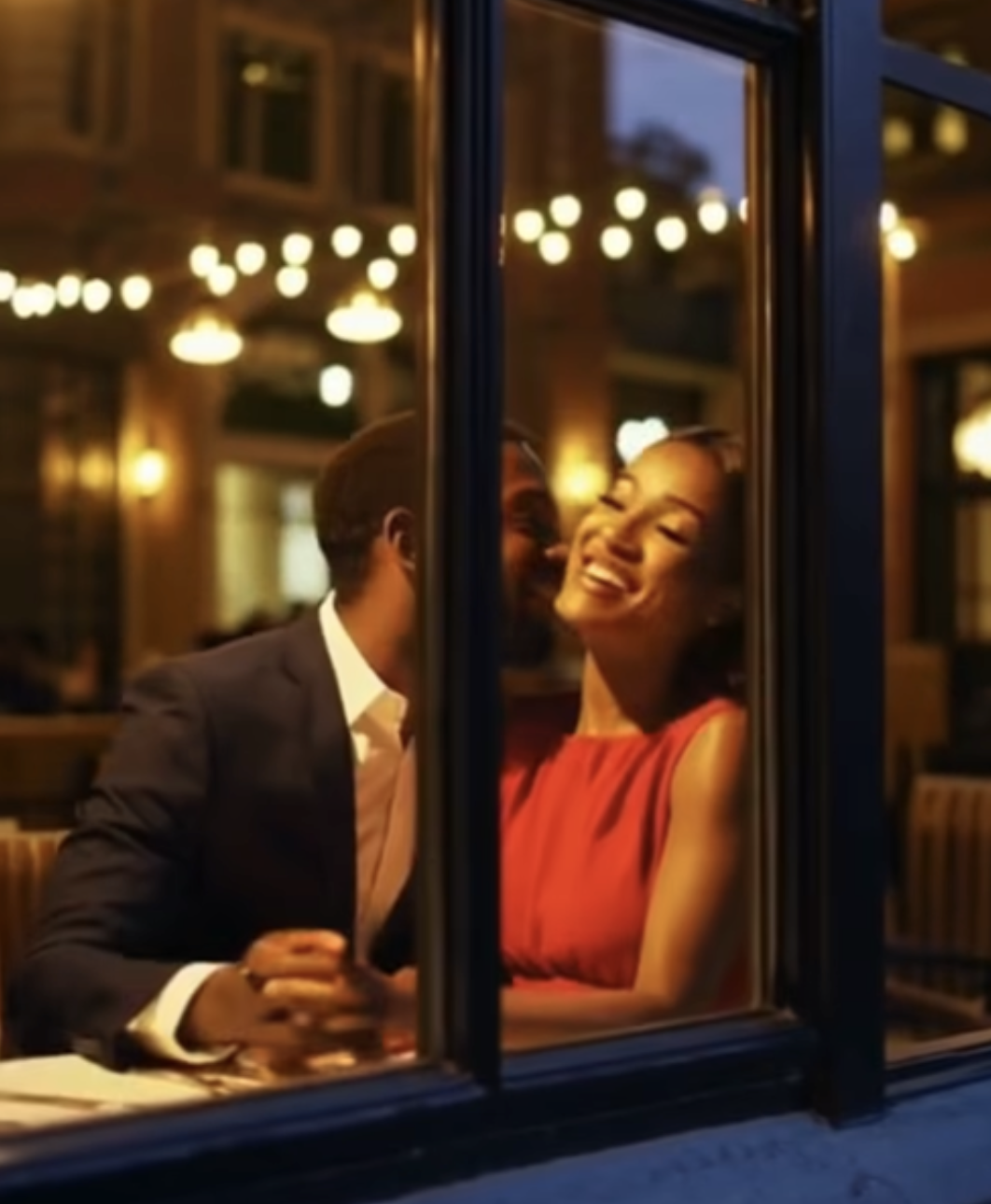I welcomed my daughter into the world at 19. Her father, Théo Rousseau, vanished from my life soon after. I chose never to speak ill of him, shielding her from pain. Elara, my daughter, kept pressing for answers. This time, her frustration boiled over. I explained he decided to leave us. She fell silent. Later, when I checked her room, her bed lay empty. A note rested on her pillow: “Mom, I can’t.”
My heart plummeted, forcing me to grip the doorframe for balance. The clock read just past midnight. Her window stood slightly ajar, the cold breeze stinging my face. My daughter was gone. My Elara, gone.
Her name is Elara, 16 years old, brilliantly sharp, stubborn like I was at her age, and recently consumed by a quiet rage. I always aimed to protect her by avoiding harsh words about her father, believing it was best. But perhaps my silence wounded her more deeply.
I contacted the police and filed a report. They urged calm, suggesting she might be at a friend’s. But I knew better. This wasn’t mere teenage rebellion. Her brief note spoke volumes: “Mom, I can’t.”
By dawn, I reached out to every friend she had, her school contacts, even Ms. Parveen, our old neighbor Elara helped in the garden. No one had seen her.
I sat in her room, surrounded by her posters, textbooks, and an open sketchpad on the floor. A half-finished drawing caught my eye—a man with Elara’s eyes. I hadn’t seen it before. It struck me: she was envisioning her father.
Then a heavier realization hit—could she have gone to find him?
Her father’s name was Théo Rousseau. We met during a summer job in Vancouver. He was charismatic, adventurous, always dreaming of global travels. When I shared news of my pregnancy, he disappeared. I never heard from him again.
Years ago, I tried locating him. But his name, common yet slightly unique, yielded no leads—no profiles, no numbers. I eventually let it go.
Elara, though, grew up with the internet at her fingertips. If she wanted to find him, she likely could.
I accessed her laptop, using her predictable password: her cat’s name and birth year. Her search history hit me like a wave:
“Théo Rousseau + Montréal”
“Théo Rousseau photographer”
“Is Théo Rousseau dead”
“how to get from Toronto to Montréal cheap”
Then I saw it: a one-way bus ticket, booked online, departing at 1:30 a.m.
I barely recall packing a bag. I borrowed my sister’s car, called in every favor, and sped toward Montréal. Five hours on the highway, no stops, no second thoughts.
I tried her phone again. Straight to voicemail.
I arrived at the Montréal bus station before noon, the place buzzing with noise and crowds. I showed Elara’s photo to anyone who might listen. No one recognized the quiet girl in the purple hoodie with a chipped blue backpack.
Then, a woman at a coffee kiosk paused. “Hold on… I think she bought a muffin here this morning. Asked about Mile End.”
“Did she say why?” I asked.
“She mentioned looking for someone who took photos there. Sounded personal, like family.”
I thanked her profusely. It was a lead.
I knew Mile End—artsy, vibrant, the kind of place Théo once dreamed of calling home, sketching ideas on napkins and raving about European art scenes.
For hours, I drove and walked the neighborhood, showing her photo to baristas, bookstore clerks, and photographers lingering on corners. Nothing.
By dusk, exhaustion weighed me down.
Then, as if guided by some strange twist of fate, I spotted a small gallery. A black-and-white photo in the window stopped me in my tracks.
A portrait of a man laughing against a brick wall. He looked exactly like Elara.
I hurried inside.
A young woman sat at the desk. I pointed to the photo. “Who’s the photographer?”
“Théo Rousseau,” she replied. “He used to shoot portraits around here a few years back.”
“Used to?”
“He stopped exhibiting here last year. But I think he’s still nearby. Let me text my friend—she might know.”
My pulse raced as she typed.
“Here,” she said at last. “Try the café on St-Viateur. He’s there sometimes.”
I was out the door before she finished.
The café was cozy, nestled between a record store and a tattoo parlor, smelling of cinnamon and fresh coffee. I stepped inside, my heart pounding.
Only four people were there. At the back, with a laptop and a coffee, sat Théo.
Older, greyer, but unmistakably him.
I froze, overwhelmed by anger, sorrow, and memories. But I wasn’t here for me.
“Théo?” I said.
He looked up, puzzled. “Yes?”
“It’s Anaëlle.”
Recognition dawned slowly. “Ana…”
He straightened, his eyes tracing my face, searching for a memory.
“It’s been sixteen years,” I said. “You have a daughter.”
His hands stilled. “I… I suspected. I didn’t think—”
“She’s here,” I cut in. “She ran away to find you.”
His jaw dropped slightly. “She’s in Montréal?”
“She left a note and took off. You don’t get to be shocked. You walked away.”
He winced, as if struck. “I thought you wanted nothing to do with me. I was a wreck back then. I didn’t believe I could be a father.”
“You never asked. Never checked.”
He rubbed his temples, nodding. “You’re right.”
I pushed down my anger. “She’s been searching for you. Drawing your face. She took a bus in the middle of the night, hoping you’d want to meet her.”
He closed his laptop deliberately. “Where is she?”
“I don’t know,” I said, tears welling. “I hoped you did.”
His face paled. “You mean… she hasn’t found me?”
“No. I found you first.”
Panic flickered in his eyes. “Then where is she?”
My breath hitched. “I don’t know.”
For the next hour, we called shelters, cafés, anywhere a lost teenage girl might turn up. I gave him her photo. He stared at it, as if seeing himself.
“She has your eyes,” I said softly.
“I see that,” he replied, his voice breaking.
At 9:20 p.m., my phone rang. An unknown number. I answered instantly.
“Mom?”
It was Elara.
“Elara—thank God. Are you okay?”
“I’m fine,” she said quietly. “I needed to think. I found the gallery with his photo. I wandered a lot. I thought I’d feel something, but I didn’t know what to do next.”
“Elara, I’m in Montréal. I found him.”
Silence. Then: “You found him?”
“I’m with him now. He wants to meet you.”
More silence.
“Where are you?” she asked.
Fifteen minutes later, she appeared. Hair tangled, hoodie unzipped, face pale. Her eyes, though, were piercing.
She studied Théo for a long moment. He stood as she entered.
“You really disappeared?” she asked.
He nodded, shame evident. “I was a coward.”
She glanced at me, then back at him. “Do you even want to know me?”
“I do,” he said. “I didn’t think I deserved to. But I do.”
She didn’t cry or shout. She walked past him and hugged me tightly.
“Can we go home first?” she whispered.
We stayed in a hotel that night. She was quiet. I didn’t press her.
At breakfast the next morning, she opened up.
“I wanted him to be a villain,” she said. “But he seemed so ordinary. It was… disappointing.”
I laughed, despite the ache.
“But I understand now,” she added. “Some people run. Some freeze. I just didn’t expect to feel so empty after meeting him.”
“He’s not the missing piece of you,” I said. “You were already complete. You just didn’t see it.”
She blinked, then smiled for the first time in days.
Théo texted later, asking if we could talk—all three of us. Elara agreed. We met in a park by the river, where he answered her every question.
He didn’t dodge or embellish. He owned his mistakes.
At the end, he said, “I don’t expect anything. I just want you to know I’m here now. To talk, to listen, or even if you need to yell.”
Elara didn’t reply immediately. But days later, back in Toronto, she sent him a photo of a painting—his face, sketched from memory, vibrant with color.
He responded: “It’s beautiful. Like the artist.”
It’s been nearly a year since that night. They talk weekly now, sometimes more.
He’s not aiming to be “Dad.” He’s simply present. Sometimes, that’s enough.
For me, I learned silence doesn’t always protect. Kids will seek answers if you withhold the truth.
But sometimes, those answers lead to new beginnings.
If this story touched you or sparked thoughts about family, share it. You never know what connections it might inspire. 💬 ❤️




